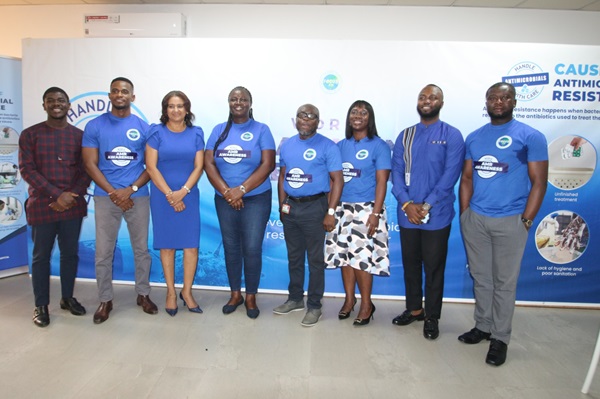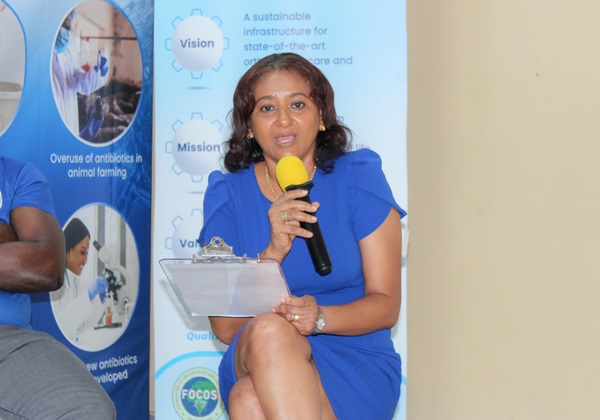
FOCOS Hospital hosts forum on Anti-Microbial Resistance
In an effort to address the growing threat of Anti-Microbial Resistance (AMR), a panel of experts have shed light on the causes, management of the phenomenon, importance of vaccination and other health matters.
Advertisement
The discussion held at the Focos Orthopaedic Hospital in Accra last week was on the theme; ‘Preventing Anti-Microbial Resistance Together’. It was in accordance with the world AMR awareness week.
The Chief Executive Officer of the hospital, Dr Irene Adorkor Wulff, set the tone for the forum by explaining the phenomenon. She said it occurred when bacteria, viruses and fungi became resistant to the medications used for the treatment of the diseases they caused.

Causes
The panel highlighted the abuse of antibiotics, not completing treatment, wrong prescriptions, ineffectiveness of drugs and mutation of certain types of bacteria as contributing factors. That, they said, happened naturally and over a long period of time.
Touching on this, the Head of Pharmacy of the hospital, Dr Benjamin Ampadu, said while some doctors might be quick to prescribe antibiotics, patients also tended to self-prescribe such drugs even for common colds.
He said now there was an alarming increase in drug-resistant infections caused by bacteria and viruses worldwide that when not handled, could pose threats to health.
Dr Ampadu advised that “whenever there is something wrong with you medically, try to resist self-medication. We have turned ourselves into doctors diagnosing all kinds of diseases, even before we get to the pharmacy and this is unhealthy”.
Management
Addressing the management of AMR, Family Physician and Diabetologist, Dr Francis Addai, said it could be curbed through regulations, continuous education and training of the citizenry, doctors and some over-the-counter medicine sellers.
Touching on regulations, the Head of the National Public Health and Reference Laboratory of the Ghana Health Service, Dr Gifty Boateng, said coordinated efforts were in place.
She highlighted a governmental policy introduced in 2017 and a national action plan to address AMR. She also asserted the key point of awareness creation, education, surveillance and research on the types of organisms that were now resistant to antibacterial drugs.
“Through these policies, some stewardship programmes have been rolled out for pharmacists and student pharmacists. There are also now microbiologists involved in researches and have published articles on AMR. Thankfully, now, more data is available on the issue of AMR” she added.
She further asserted the need to equip laboratories in the country with infrastructure, tools and training to enable them identify some of these issues.
Dr Boateng however lamented the inadequacy of funds in implementing some policies. “Monitory and evaluations of some orthodox and herbal drugs that come into the country from various angles is also an issue”, she added.
She called on agencies, government and individuals to help in the combat of this health emergency.
Dr Francis Addai added his voice to the progress made in AMR awareness. He commended the Bolgatanga Regional Hospital and the MDS Lancet Laboratories for their effort in terms of research and laboratories.
Vaccination
Part of the discussion was the issue of lack of vaccination in adults. Nurse Manager of the hospital, Claudia Wireku-Tei, touched on the importance of vaccination in both adults and children.
She said vaccination was important in preventing certain illnesses that might be caused by bacteria, fungi or viruses.
Another panellist, Public Health Specialist of the hospital, Dr Bismarck Adams, advised that adults could get vaccinated against some diseases such as, Hepatitis B and Human Papilloma Virus(HPV) for the prevention of cervical cancer, genital warts, etc. in women.
He however said in-depth consultation with a medical professional to ascertain the need and suitability was necessary before any form of vaccination was embarked upon.
As the discussion concluded, the panel called for an increased investment in research and development, strengthened international collaborations and enhanced public awareness campaigns.
They also emphasised the need for a multi-sectoral approach to combat AMR, involving not only healthcare professionals but also policymakers, educators, the media and the general public.




